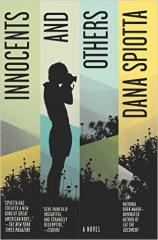Innocents and Others
Review
Innocents and Others
Dana Spiotta is one of those writers whose work seems inseparable from the zeitgeist. Whether she's writing about a ’60s-era radical's perilous life decades later in EAT THE DOCUMENT, or the music business in STONE ARABIA, both her subject matter and style hum with the electricity of contemporaneity. Her new novel, INNOCENTS AND OTHERS, the story of two female filmmakers and their lifelong friendship, is no exception. It's a cerebral character study that probes a host of questions about truth as it's presented to us in the medium of film --- the most powerful storytelling tool of our age.
The nonlinear narrative of INNOCENTS AND OTHERS flows out of the stories of Meadow Mori and Carrie Wexler, childhood friends in 1980s Los Angeles (where Spiotta spent some of her adolescence when her father ran Francis Ford Coppola's Zoetrope Studios), whose passion for film inspires their life's work. In a reminiscence of that period three decades later, Carrie describes how "we became our own insular world of reference and repetition. If you didn't know the films, you didn't know us."
"Spiotta raises challenging questions about identity, truth and the power of flickering images on a screen. All of them help secure her status as a writer whose work will continue to merit our close attention."
Though they feast on the same banquet of movies, their professional paths diverge dramatically. In the isolation of New York's Mohawk Valley, Meadow produces Errol Morris-style documentaries on subjects like the 1970 Kent State shootings or Argentina's "disappeared," while Carrie turns out commercially popular comedies that today might serve as the next star vehicle for Kristen Wiig or Melissa McCarthy. How they reflect life back to their audiences couldn't differ more starkly, an artistic choice that contributes to a tension in a relationship that Spiotta portrays efficiently and realistically, all the while displaying a clear understanding of the qualities that allow certain friendships to endure even in the most difficult circumstances.
But INNOCENTS AND OTHERS becomes more than the story of these women when Spiotta introduces Amy, whose boyfriend nicknames her "Jelly Doughnut" (Jelly, for short) and who calls herself Nicole in the conversations she initiates with powerful men in Hollywood from her apartment in the suburbs of Syracuse. Her chats with Jack Cusano, a prominent record producer, don't involve, as might be expected, phone sex, but instead the search for an intimate connection between two lonely people. The phone becomes, in Jelly's slowly dawning recognition, a "weapon of intimacy." But their conversations become problematic when Jack decides he wants to meet the homely, visually impaired, overweight Jelly, who knows she can't allow that to happen and takes an extreme step to ensure it won't.
Meadow learns of Jelly's activities and decides to make her the subject of a documentary film she calls Inward Operator because "the perverse idea of doing a film about the power of voice excited her." Reflecting on her extensive phone encounters with Jack, Jelly understands that their "contours were collaboration, built of his desires and her omissions." Like Meadow, who believes that "a lie of invention, a lie about yourself, should not be called a lie," Jelly does not see her own fabrications as falsehoods. "He assumed things; she just didn't correct them," she concludes, rationalizing her interactions with Jack.
Despite that shared sensibility, like many a documentary film subject, Jelly is dismayed when she grasps the implications of allowing her story to be told on the screen. She confronts Meadow in a climactic phone call: "Not everything needs to be filmed. Not everything needs to be seen, to be public. What good did it do? What was it for?" she asks. Meadow's need to find answers to those stark questions sets her on a path of both despair and redemption. And in a world where it seems anyone is only an Instagram or YouTube video away from stardom or infamy, Jelly's questions lurk like land mines waiting to detonate.
Spiotta, who teaches creative writing at Syracuse University, blends conventional narrative with a variety of other devices --- blog posts and their comments, film transcripts and interviews --- to tell this seductive story. She's less concerned about plot development than she is in teasing out her characters' secrets, their motivations and desires. In doing that, she's committed to a spare style that, in its suggestiveness, often hints at much more than what is on the page. INNOCENTS AND OTHERS is a novel about how we represent ourselves and how we sometimes allow ourselves to be represented by others. Spiotta raises challenging questions about identity, truth and the power of flickering images on a screen. All of them help secure her status as a writer whose work will continue to merit our close attention.
Reviewed by Harvey Freedenberg on March 17, 2016
Innocents and Others
- Publication Date: November 15, 2016
- Genres: Fiction
- Paperback: 288 pages
- Publisher: Scribner
- ISBN-10: 1501122738
- ISBN-13: 9781501122736





